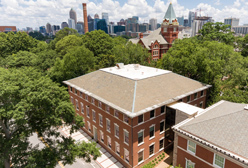Sponsored Research
"Making Scientists for a Democratic South Africa," a project by Anne Pollock, professor in the School of Literature, Media, and Communication, was funded $110,030 by the National Science Foundation.
"Exploring Future-Oriented Partnership between ROK and US in Nuclear Energy and Fuel Cycle Development," a project by Adam Stulberg, professor in The Sam Nunn School of International Affairs, was awarded $30,000 by the Korea Foundation.
Recent Books
NASA in the World: Fifty Years of International Collaboration in Space (Palgrave Macmillan, 2013) by John Krige, professor in the School of History, Technology, and Society, Angelina Long Callahan, and Ashok Maharaj, uses agency archives and personnel to explore NASA's international collaboration throughout its history.
Space Shuttle Legacy: How We Did It and What We Learned (American Institute of Aeronautics and Astronautics, 2013) by John Krige, in collaboration with Professor Emeritus James Craig and Roger Launius, examines key aspects of the program, including its history, successes, failures, and lessons learned.
Reporting at the Southern Borders: Journalism and Public Debates on Immigration in the U.S. and the E.U. (Routledge, 2013) by Vicki Birchfield, associate professor in The Sam Nunn School of International Affairs, and co-edited by Giovanna Dell'Orto, provides an insider’s perspective on journalistic practices in regard to undocumented immigration across the Mediterranean and US-Mexican borders.
Signifying the Local: Media Productions Rendered in Local Languages in Mainland China in the New Millennium (Brill, 2013) by Jin Liu, assistant professor in the School of Modern Languages, examines contemporary cultural productions rendered in local languages and dialects in the fields of television, cinema, music, and literature in Mainland China.
What Does Georgia Tech Think?
Selected Press for Ivan Allen College of Liberal Arts
|
Bogost on MOOCs
“If the lecture was such a bad format in the industrial age, why does it suddenly get celebrated once digitized and streamed into a web browser in the information age?" asked Ian Bogost, professor in the School of Literature, Media, and Communication, in an essay referenced by Slate. Source: Slate, September 18, 2013
Nunn on U.S.-Russia Deal to Remove Chemical Weapons in Syria
“It’s in Russia’s interest to make sure this is carried out,” said former Senator Sam Nunn on the U.S. efforts to enforce its Geneva agreement with Russia to find and destroy Assad's chemical weapons. “It’s healthy for Russia to be involved in leadership. For too long, we and the Russians have thought in the terms of a zero-sum game. This is a win-win if we can get it done.” Source: MSNBC, September 17, 2013
Utz on Academics Returning to Germany
"I am not so sure, however, that it isn’t the German academic system itself that is not yet “fit” to adapt to or even embrace the diversity and wealth of innovative ideas these expats and other international colleagues would bring with them" wrote Richard Utz. Utz is chair and professor in the School of Language, Media, and Communication. Source: Inside Higher Ed, September 16, 2013
Head on MOOCs
"We frequently hear this topic talked about in terms of 'disruption,' a word I really disdain," wrote Karen Head, "I wonder how such a term—meaning disorder, turmoil, destruction—became the preferred way to talk about improving education. Why haven’t we gravitated instead to words like augment, extend, progress, or strengthen?" Head, a professor in the School of Literature, Media, and Communication, reflected on her experience teaching a MOOC. Source: Chronicle of Higher Education, September 6, 2013
October 24, 2013
11:00 am
October 25, 2013 - October 27, 2013
8:00 pm
November 11, 2013
4:00 pm
November 12, 2013
6:00 pm
November 13, 2013 - November 14, 2013
7:30 pm
November 13, 2013
8:00 pm
November 14, 2013
8:00 pm
November 15, 2013 - February 11, 2014
10:00 am
November 15, 2013
2:00 pm
November 15, 2013
8:00 pm
November 16, 2013
8:00 pm
November 18, 2013
4:00 pm
November 20, 2013
8:00 pm
November 21, 2013
4:30 pm
November 21, 2013
8:00 pm
November 22, 2013
2:00 pm
November 22, 2013
8:00 pm
|

|
Where in the World are Young People Using the Internet? New Study Measures Digital Natives in Every Country
A common myth today is that young people are all glued to the Internet, but in fact, only 30 percent of the world’s youth population between the ages of 15 and 24 years old have been active online for at least five years.
In South Korea, 99.6 percent of young people are active, the highest percentage in the world. The least? The Asian island of Timor Leste with less than 1 percent.
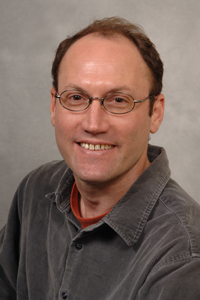 Those are among the many findings in a study from The Sam Nunn School of International Affairs Assistant Professor Michael Best and the International Telecommunication Union (ITU). The study is the first attempt to measure, by country, the world’s “digital natives.” The term is typically used to categorize young people born around the same time as when the personal computer was introduced and who have spent their lives connected with technology. Those are among the many findings in a study from The Sam Nunn School of International Affairs Assistant Professor Michael Best and the International Telecommunication Union (ITU). The study is the first attempt to measure, by country, the world’s “digital natives.” The term is typically used to categorize young people born around the same time as when the personal computer was introduced and who have spent their lives connected with technology.
Nearly 96 percent of American millennials are digital natives. That figure is behind Japan (99.5 percent) and several European countries, including Finland, Denmark, and the Netherlands.
But the percentage Best thinks is most important is the number of digital natives compared to a country’s total population.
“That’s because a country’s future will be defined by today’s young people and by technology,” said Best, who co-led the study and, jointly with ITU, developed the model that calculated the worldwide figures. “Countries with a high proportion of young people who are already online are positioned to define and lead the digital age of tomorrow.”
The countries with the highest proportion of digital natives among their population are mostly rich nations, which have high levels of overall Internet penetration. Iceland is at the top of the list with 13.9 percent. The United States is sixth (13.1 percent). A big surprise is Malaysia, a middle-income country with one of the highest proportions of digital natives (ranked fourth at 13.4 percent). Malaysia has a strong history of investing in educational technology.
The countries with the smallest estimated proportion of digital natives are Timor-Leste, Myanmar, and Sierra Leone. The bottom 10 consists entirely of African or Asian nations, many of which are suffering from conflict and/or have very low Internet availability.
However, the report notes that Internet usage has increased significantly in the developing world during the past five years. The ITU believes the digital native population in these regions will more than double by 2017.
Overall, there are approximately 363 million digital natives out of a world population of nearly 7 billion (5.2 percent).
“Youth are transforming our world through the power of information and communication technologies,” said Hamadoun Touré, ITU secretary-general. “The Youth Declaration developed at ITU’s BYND2015 Youth Summit in Costa Rica and presented to the United Nations General Assembly last week by Costa Rican President Laura Chinchilla calls for more measurable targets to monitor the digital empowerment of young people at national, regional, and international levels. This first attempt to measure the number of digital natives around the world is a valuable first contribution to this effort.”
The model was developed using data collected by the ITU through surveys conducted around the globe. The study is part of the ITUs Measuring the Information Society 2013 report, which was released on October 7.
Best is a faculty member in The Sam Nunn School of International Affairs with a joint appointment in the College of Computing. His research focuses on information and communication technologies for social, economic, and political development, primarily in low-income countries in Africa and Asia.
|
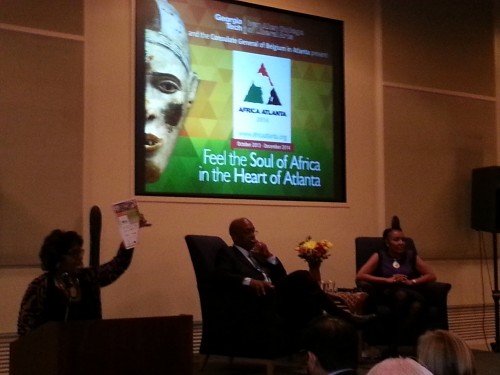
|
The Last Frontier - Africa Atlanta 2014 Fall Activities are Underway!
“Africa is the last frontier for enterprise," said Haskell Ward, SVP for government relations at Black Rhino Group, during a salon this past Tuesday. The salon was the first of the fall pre-events for Africa Atlanta 2014. Upcoming activities include an Atlanta film premiere, author/film-maker dialogues, a theatrical production, a special fundraiser, a food festival, and the opening of a major art exhibition.
Nearly 80 people attended the dialogue with Ward entitled, Reflections on Africa: Then and Now. Interviewed by his wife, Chief Justice Leah Ward Sears (retired, Georgia Supreme Court), Ward shared insights from his fifty years of Africa-related work in policy, relations, and enterprise for government, non-profit and business. "The rest of the world is quite happy that the U.S. is not engaged in Africa because they don’t have to compete with us there,” said Ward. He called for change in the U.S. model for interaction with Africa which "is based upon a premise that we know better than they." "Listen, rather than lecture," said Ward. He added that, despite the vastness and diversity of Africa, a commonality among its people is the "huge premium placed on personal interaction. It's a fundamental behavior."
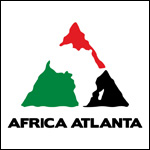 Coming Up: Coming Up:
November 6: (Arts & Culture) Alice Walker: Beauty in Truth. The Atlanta premiere of this penetrating documentary about the life, art, and activism of the Pulitzer Prize-winning author of The Color Purple.
November 8: (Education) A Conversation with Chadian film maker Mahmat-Saleh Haroun, award-winning director of Bye Bye Africa, Dry Season, and A Screaming Man. Georgia Tech Bill Moore Student Success Center.
November 12: (Education) Talk and Taste salon with awarding-winning journalist and civil rights icon Charlayne Hunter-Gault and her husband Ron Gault. Wine tastings from their South African vineyard, Passages. Rialto Center for the Arts.
November 13 & 14: (Arts & Culture) Mother to Mother Theatrical Production. Sindiwe Maagona's poignant and powerful one-woman play inspired by the true story of the murder of Amy Biehl, a Fulbright Fellow who was murdered by African youths. November 13 is a special fundraiser. Balzer Theatre.
November 15: (Arts & Culture) One of Georgia Tech's largest-ever cultural events, Taste of Africa is hosted by the Africa Student Association to spread awareness and understanding of the many African cultures through song, dance, food, acting, fashion and more. Ferst Center for the Arts.
December 14, 2013 - March 9, 2014: (Arts & Culture) Romare Bearden: A Black Odyssey. Rich in symbolism and allegorical content, Bearden's Odyssey series creates an artistic bridge between classical mythology and African American culture. Michael C. Carlos Museum, Emory.
Visit www.africaatlanta.org.
|

|
Uwaifo-Oyelere Highlights New Research on Racial Gap in Self-Employment Research Federal Reserve Policy Summit
Economics Assistant Professor Ruth Uwaifo-Oyelere was an invited speaker at the 2013 Policy Summit on Housing, Human Capital, and Inequality at the Federal Reserve Bank of Cleveland.
Uwaifo-Oyelere presented her research, a collaborative effort with Economics Professor Willie Belton, on the role of past institutions and information in explaining the black-white gap in self-employment in the U.S. She also discussed policy implications of this research.
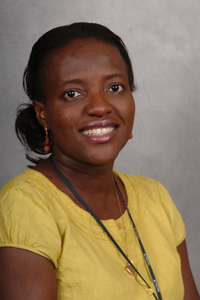 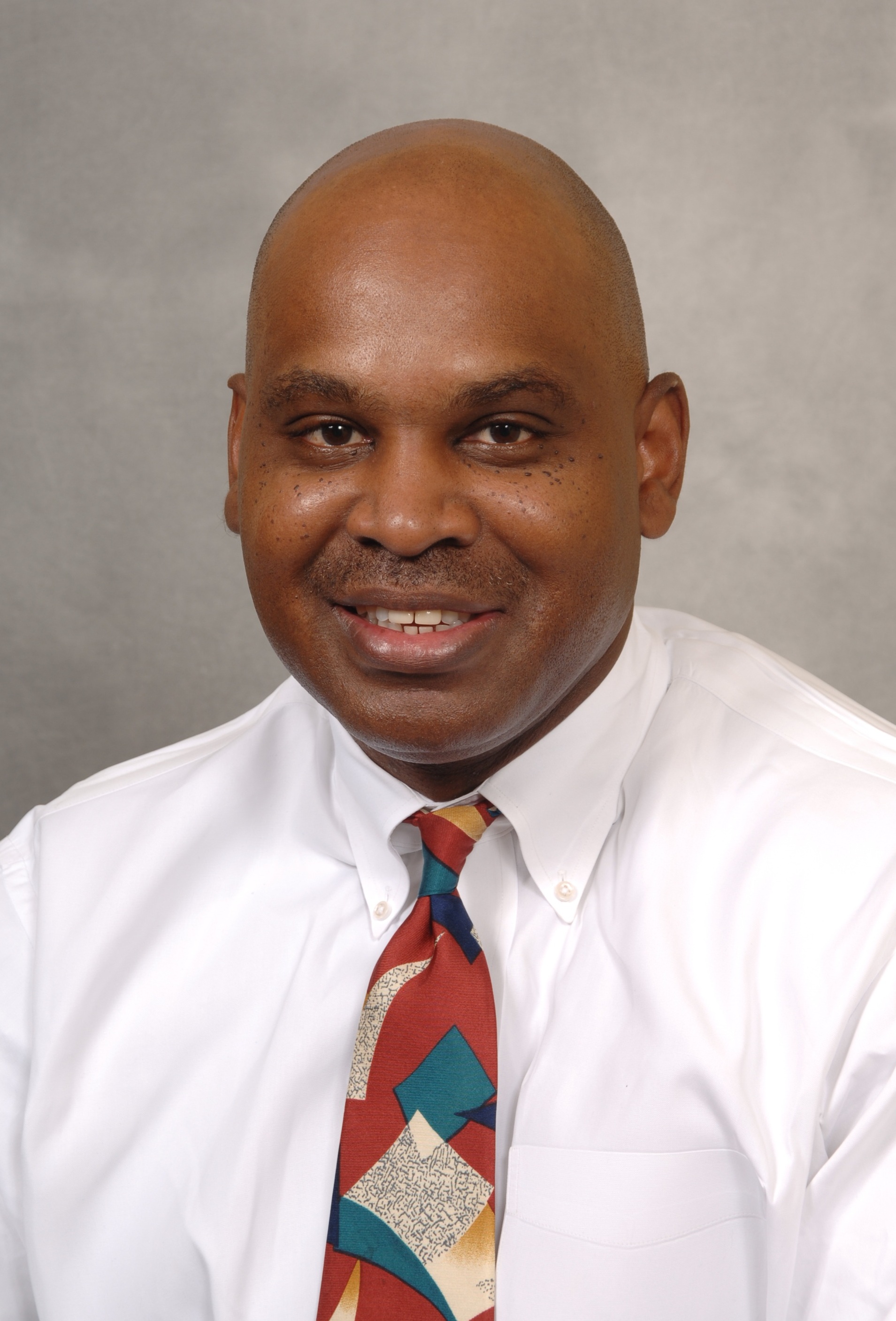
Past literature has suggested that African-American self-employment rates lag far behind those of other racial groups in the U.S. Similarly, the literature also provides evidence of the long-lived nature of institutions and the relationship between institutions, decision-making, and socio-economic outcomes.
In their study, “Black–White Gap in Self-Employment. Does Intra-Race Heterogeneity Exist?" Uwaifo-Oyelere and Belton provide an explanation for the self-employment gap, focusing on the significance of repeated negative institutional shocks and how such shocks could have influenced individual's perception of success in self-employment and deterred entry. The study finds that African-Americans, who were less likely to be influenced by negative institutional shocks and the information transmission from these experiences, have similar self-employment probabilities to comparably situated white Americans. This research is the first to highlight intra-race and cohort differences in the self-employment gap.
More information on the Policy Summit can be found at http://www.clevelandfed.org/community_development/events/ps2013/index.cfm.
|
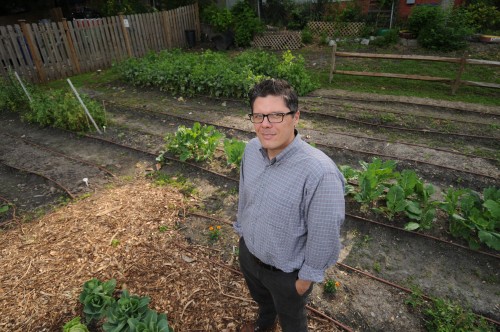
|
DiSalvo Fosters Community Involvement through Digital Media
One's academic impulses can take an unexpected turn sometimes, as Carl F. DiSalvo discovered when he was a graduate student at Carnegie Mellon University.
"I had the opportunity to work with professors who were really committed to community engagement, both in terms of community building and learning," says DiSalvo, an assistant professor in the Graduate Program in Digital Media, School of Literature, Media and Communication. "I hadn't thought about that before, and it wasn't something I had initially planned on doing."
DiSalvo studies the products and process of interaction design. The interdisciplinary work, which draws from the humanities, science and technology, and design, aims to increase community building and public engagement through digital media. He is assisted by graduate student Thomas Lodato.
How would you characterize your research?
My research has to do with engaging with the public around issues of science and technology, more specifically around the design of digital communications infrastructures to support social interaction. Much of my current work is focused on small-scale agriculture and exploring how we can design digital technologies to support local food-production activities and systems.
Why the focus on food systems?
Here in Georgia, lots of people care about locally grown food, and they participate in local food production activities. It's a form of social interaction that promotes community building.
For example, many people participate in community gardens. Others have sizable gardens, and they might sell their produce at a local farmer's market or even give their food away—that's really important to food banks and churches and other services that provide fresh fruits and vegetables to people in need.
We're also thinking about people who make food products—cheese makers, sausage makers.
Someplace else, you might have community concerns around another issue—pollution, for example. The communication tools we'd want to develop in that area would be different, but the basic question would remain the same: How do we provide technology tools for people who want to pursue these community-based projects and help them succeed with them?
Once we develop these practical tools, we want to communicate our findings to other researchers who are interested in finding ways to facilitate community participation, so they can see if what we've done can be adapted to their own particular areas of interest.
How might communications technology support local food-production systems?
One of the basic questions is land use. Let's say you want to grow a garden, and you pass by an empty plot of land every time you go into town. How do you find out whether or not you can use that land? How do you find out if the city or a private business owns that land, or how it's zoned? We want to know how these answers can be communicated to people and provide them with access to underutilized land.
Here's another example: Right behind Decatur High School is a large community garden. Folks are out there all the time. They probably don't need technology to make their farm work, it probably works fine as it is, but the people in charge may be able to use technology to help manage and communicate with their volunteers.
How do you go about identifying the problems that communications technology might address?
Hackathons are where people get together and work on problems for a day or two in a really concentrated way. We're developing a series of hackathons in Atlanta that will look at the question: How can we better design technology to support local food systems?
We're going to bring together about 50 people from various walks of life. We have collaborations with the Atlanta Local Food Initiative, the city of Atlanta mayor's office, the Atlanta Food Bank, as well as with programmers and designers, and community advocates. They'll spend a day developing prototypes of new information systems to support local food production.
Who will use the information that comes out of these hackathons?
Our hope is that on a pragmatic level something will get built—an idea will be generated, and over the course of the next year an actual tool gets produced that will be used by the citizens of greater Atlanta.
At the same time, our findings will be communicated to research communities that are interested in ideas surrounding community participation. The questions these researchers ask are, What sorts of resources do we need to facilitate community participation, and how do we evaluate it? There is a lot of discussion about the subject because it's not clear how participation actually happens or becomes sustaining—how it evolves from a bunch of people with a common interest getting together on weekends to do some kind of activity, to something deeper that builds a sense of community. So we want to evaluate whether or not a participatory activity has meaningful effect and develop rubrics for assessing participation.
How does this research complement your job as a teacher?
I bring this research to a project studio I teach where we're working with a small farm over on English Avenue called the Friends of English Avenue Farm. This is a very special place. It's a small endeavor on a vacant lot where a house once stood, and it's run by two people. They grow fruits and vegetables and then every other week give them away to people in the neighborhood who are in need. It's a wonderful service.
The class studies the operation to determine what kinds of tools we can provide for these folks to help them better manage their farm, attract donors and volunteers, and communicate their mission and success to a larger audience. For example, we created a visualization tool—a web-based application that takes raw data and converts it into various graphical formats—that enables Suzanne Baker at the Friends of English Avenue to chart her farm's yield over time. Using this tool she can show in a compelling visual format how much produce and the variety of produce that the farm has contributed to the community over time. In addition, we redesigned the Friends of English Avenue website to better integrate with social media and feature rich visual content, such as photos and an interactive timeline. This further enables Suzanne to share the important work of the Friends of English Avenue.
This project is affiliated with Georgia Tech’s Westside Communities Initiative. Led by Ivan Allen College and the College of Architecture, the initiative is connecting people and organizations across the Institute and across Atlanta to create sustainable solutions and foster points of unity.
Carl F. DiSalvo is an associate professor in the School of Literature, Media, and Communication. He earned a PhD in Design from Carnegie Mellon University (CMU) in 2006 and was a visiting fellow in The Studio for Creative Inquiry and The Center for the Arts in Society from 2006-2007 (also at CMU). His work explores the intersection of design, art, technology, and politics. His recent design projects have focused on the development of participatory public programs and technology platforms that foster critical engagements with robotics, environmental sensing, and local small-scale farming.
|
Senate Confirms Brown for Second Term on TVA Board
|
|
Marilyn Brown was confirmed by the U.S. Senate on Tuesday, September 10, for a second term on the board of directors for the Tennessee Valley Authority (TVA), the nation’s largest public power provider. President Obama nominated Brown in 2009 for a term that ended in May 2012. This second term of service will run through May 2017. Brown is an endowed professor of energy policy in the Ivan Allen College School of Public Policy, where she has established the Climate and Energy Policy Laboratory (www.cepl.gatech.edu), helped establish an Energy Systems minor, and is co-investigator of a National Science Foundation initiative on energy materials and policy. Previously, she worked at the Oak Ridge National Laboratory, where she held various leadership positions. She has authored two books and more than 250 publications. She was a co-recipient of the Nobel Peace Prize in 2007 for her work on the Intergovernmental Panel on Climate Change. Brown helped to launch and chaired the board of directors of the Southeast Energy Efficiency Alliance. She served on the boards of directors of the American Council for an Energy-Efficient Economy and the Alliance to Save Energy and was a member of the National Commission on Energy Policy for many years. She has served on six National Academy committees related to energy and environmental issues. The TVA generates electricity for business customers and local power distributors serving nine million people in parts of seven southeastern states. |
Comfort Recipient of 2014 Regents' Teaching Excellence Award
|
|
Kelly Comfort, professor in the School of Modern Languages, is the recipient of the 2014 Regents’ Teaching Excellence Award. This year, Georgia Tech gave Comfort the Class of 1940 W. Howard Outstanding Teaching Award, which recognized her extraordinary efforts to inspire students. She also received the CETL Innovation in Co-Curricular Education Award. Comfort encourages students to be active inside and outside of the classroom. Much of her coursework involves students with Atlanta’s Latino community. Her Intermediate Spanish and Spanish Conversation courses include interview and documentary projects in the community, while higher level courses require from 30 to 60 hours of work with native Spanish speakers. These projects include volunteer work, professional work, community outreach, roundtable discussions with local Latino leaders, and cultural case studies. These experiences build not only fluent Spanish speakers, but students that are able to critically reflect on their experiences. Comfort is the faculty director of the International House and faculty advisor of Gringos y Latinos: Atlanta’s Spanish Service Society. Comfort drives her students to become active, critical, and self-reflective. The Ivan Allen College of Liberal Arts is committed to sustaining a legacy of humanitarian vision, social courage, social justice, and civic leadership. Comfort's approach to teaching embodies that commitment. Learn more about Comfort's passion for service learning in the July 2013 feature on our website. |
Georgia Tech Professor Christine Ries Elected to Georgia Cyber Academy Board
|
|
Economics Professor Christine P. Ries has been elected to serve on the board of the Georgia Cyber Academy (GCA), Georgia's first-ever virtual public charter school and the largest public school in the state. Dr. Ries has long been engaged in service to boards of both private and public K-12 schools and is currently involved in research on the impact of emerging digital teaching technologies on both K-12 and higher education reform. Founded in 2007, GCA has grown to serve 13,000 full-time students in grades K-12 from 157 counties across Georgia. Authorized by the State Charter Schools Commission and fully accredited by AdvancEd, GCA has a proven track record of academic achievement with its students consistently demonstrating academic growth above national averages. With a faculty and staff of over 400state-certified and highly qualified teachers and staff, GCA has been a leader in providing an engaging and individualized tuition-free education to a diverse group of Georgia students. |
Dhongde Presents Research on US Poverty at Stanford University
|
|
Shatakshee Dhongde, assistant professor of economics in the Ivan Allen College of Liberal Arts, presented her research on “Multidimensional Poverty in the U.S.” at Stanford University on September 27, 2013. She discussed the methodological problems associated with measuring multidimensional poverty and presented new poverty estimates for the U.S. based upon the latest American community survey data. Dhongde was one of the few candidates selected to participate in the New Scholars Conference, which is organized annually by the Stanford Center on Poverty and Inequality (CPI). One of three National Poverty Centers, CPI is a nonpartisan research center dedicated to monitoring and analyzing trends in poverty and inequality. |
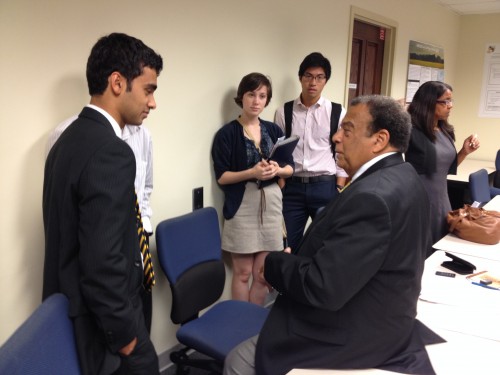
|
Andrew Young Critiques Policy Briefings by International Affairs Students
Students in The Sam Nunn School of International Affairs recently had their work critiqued by a foremost expert in foreign policy and development, Ambassador Andrew Young.
As a special guest in the “Global Issues and Leadership” class, Young provided feedback on team presentations assessing the rapidly changing landscape of foreign aid and development policy in the Middle East and Africa. The assignment required students to consider the implications of a looming global food crisis; the historical clash between religious, tribal and political sects; and competing long-term global economic interests. Young’s extensive experience in foreign policy includes leadership roles as Mayor of Atlanta, U.S. Ambassador to the United Nations, U.S. Congressman from Georgia, and Chairman of the Southern African Enterprise Development Fund.
For further information about this seminar, contact Nunn School Chair Joseph Bankoff or Kenneth Knoespel, Director of the Allen Institute for Advanced Studies and professor in the School of Literature, Media, and Communication.
|
Poets on Deck at Georgia Tech
|
|
Georgia Tech may seem an unlikely place for poetry, but alumnus Bruce McEver, who endowed the McEver Chair in Poetry so that the Ivan Allen College School of Literature, Media, and Communication can bring top writers to campus, emphasizes poetry's importance in understanding the context and impact of the technical expertise students are gaining at Georgia Tech. McEver, who graduated from Georgia Tech as an industrial engineer, believes that his understanding of the relationships between the mechanical arts and fine arts formed the foundation of his business acumen and success. He credits his former English professor James Dean Young for his love of poetry and encourages all Georgia Tech students to enhance their lives by integrating the technical aspects of engineering with the techniques of poetry. Read the full cover story in Atlanta Senior News |
Levine Honored as Georgia Power Professor of Excellence
Aaron Levine, associate professor in the Ivan Allen College School of Public Policy, will be honored as a Georgia Power Professor of Excellence during the Georgia Tech football game against Syracuse on October 19.
Levine's research focuses on understanding how the policy environment influences the development of ethically contentious new technologies, particularly in the life sciences. His recent work has examined human embryonic stem cell research policy and oversight of the fertility industry. In 2012, Dr. Levine received a five-year NSF CAREER award to explore the impact of working in an ethically contentious field on graduate student learning.
|
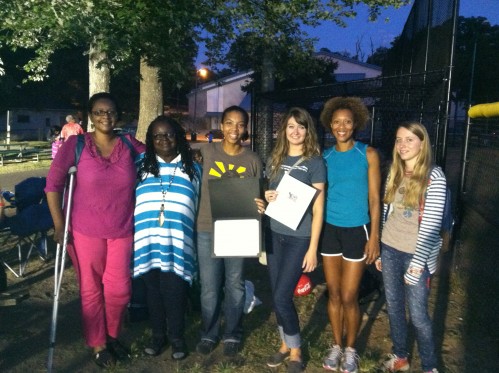
|
Westside Communities Alliance Honored by Washington Park Community
What a difference seven months can make. In February, Christi Jackson demanded more attention from the Westside Communities Alliance (WCA) for the Washington Park neighborhood. On September 14, The Conservancy at Historic Washington Park presented its inaugural “Excellence in Leadership” award to the WCA.
"This year, the WCA has stepped up to become a true resource for the entire Historic Washington Park District,” said Jackson, who is executive director of The Conservancy. “Whether it is providing technical assistance or volunteers, we rely on the expertise provided by our growing association with the WCA. Ultimately, the Westside Communities Alliance helps us be successful as an organization."
The brainchild of Ivan Allen College Dean Jacqueline J. Royster, part of WCA's core mission is coordination and communication among communities. Since Jackson’s appeal last February, the WCA has connected Washington Park leadership with other neighborhood organizations and resources. The result has been more robust participation and impact for Washington Park initiatives. For example, at the Jody Brooks Memorial Movie in the Park, international athlete Qiana Martin hosted the first Pop Up + Play event, where neighborhood youth learned soccer skills. This collaboration came about through introductions by the WCA.
Sheri Davis-Faulkner in the Ivan Allen College dean’s office is Community Liaison for the WCA. “This is what the WCA does: We facilitate these kinds of connections and provide expertise and volunteers.”
Through the WCA, Georgia Tech is involved in several Washington Park projects: a design studio led by Herman Howard in the College of Architecture; a white paper on the re-use of the historic E.R. Carter school that is being developed collaboratively with IAC advisory board member, Haywood Solomon; and a neighborhood canvassing project and a playground clean-up with student volunteers from the Georgia Tech Office of Minority Educational Development--an event that served as a catalyst for a community grant from Park Pride.
“The WCA is excited about the next stages of the relationship with Washington Park as a full and active partner in the Alliance,” said Davis-Faulkner. “This kind of relationship is what we strive for, because this is how, together, we can do better as a community.”
|
IAC Academic Reception Welcomes Parents, Students
|
|
|
|
Dean Royster and college faculty, administrators, advisors, and the student advisory board welcomed parents and students at the Ivan Allen College academic reception on September 20, as part of Georgia Tech's annual Family Weekend. With almost 80 attendees, the reception presented study abroad and career opportunities, as well as ways for students to get involved on campus. |
|

